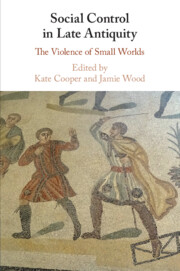Book contents
- Social Control in Late Antiquity
- Social Control in Late Antiquity
- Copyright page
- Contents
- Contributors
- Preface and Acknowledgements
- Abbreviations
- Introduction
- Part I Women and Children First
- Part II ‘Slaves, be subject to your masters’
- Chapter 5 Modelling Msarrqūtā
- Chapter 6 Constructing Complexity
- Chapter 7 Disciplining the Slaves of God
- Part III Knowledge, Power, and Symbolic Violence
- Part IV Vulnerability and Power
- Bibliography
- Index
Chapter 6 - Constructing Complexity
Slavery in the Small Worlds of Early Monasticism
from Part II - ‘Slaves, be subject to your masters’
Published online by Cambridge University Press: 18 September 2020
- Social Control in Late Antiquity
- Social Control in Late Antiquity
- Copyright page
- Contents
- Contributors
- Preface and Acknowledgements
- Abbreviations
- Introduction
- Part I Women and Children First
- Part II ‘Slaves, be subject to your masters’
- Chapter 5 Modelling Msarrqūtā
- Chapter 6 Constructing Complexity
- Chapter 7 Disciplining the Slaves of God
- Part III Knowledge, Power, and Symbolic Violence
- Part IV Vulnerability and Power
- Bibliography
- Index
Summary
This chapter examines narrative representations of slavery in early monasticism. It then reads these accounts in light of extant material remains and in conversation with prescriptive regulatory precepts. Such contextualisation necessarily situates emergent communities within a late-Roman world where ‘attitudes of slaveholders [remained] constant’ and the ‘conditions in which slaves lived and worked persisted from generation to generation’ (Glancy). As the cracks and fissures routinely glossed over in more seamless depictions underscore the degree to which monastic ideals and ideologies, institutional and relational norms, remain inextricably intertwined with wider Greco-Roman practice, the chapter posits that emergent monastic mores may be best understood as at once dismantling and reinscribing the structural hierarchies of slavery. Against this landscape, where the jagged edges of lived experience remain patent, the chapter simultaneously premises reconceptualisations that effectively disrupt both static idealisation and wholesale denigration. Through engaging reading strategies that resist the limitations implicit to binaried definitions of practice, its aim is to breathe life into the larger than life.
Keywords
- Type
- Chapter
- Information
- Social Control in Late AntiquityThe Violence of Small Worlds, pp. 131 - 150Publisher: Cambridge University PressPrint publication year: 2020

